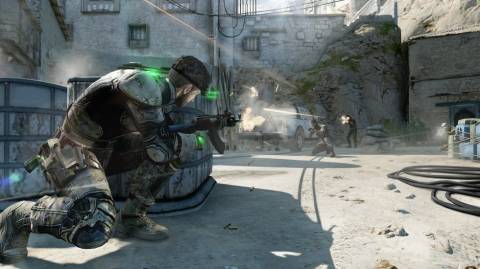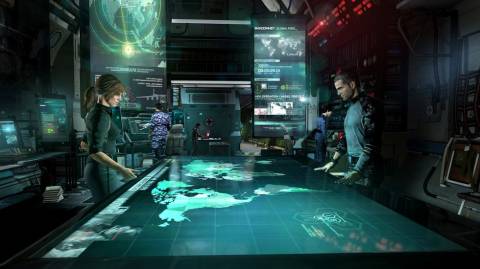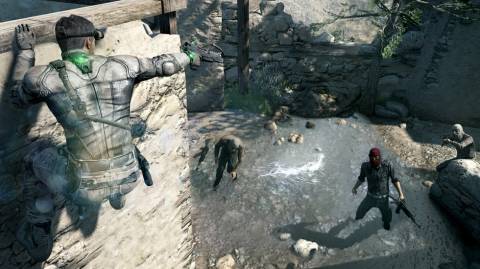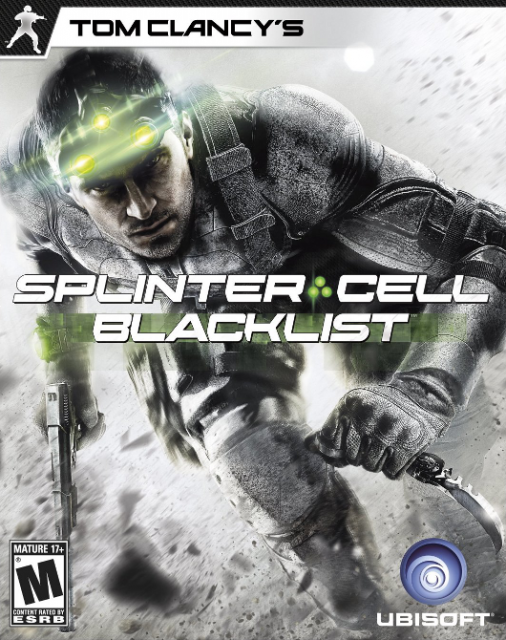Blacklist isn't a revolution for the series but a refinement of all that has come before
Tom Clancy’s Splinter Cell series was once the number one choice for stealth aficionados, but with each subsequent success has come a desire to attract new audiences. Splinter Cell: Conviction was the most recent and exceedingly bold attempt to appeal to a more action-oriented crowd, abandoning the carefully structured and methodical pacing of series highlight Chaos Theory, and adopting a frenetic style where bullets reigned over the auspicious use of shadows. With Splinter Cell: Blacklist, newly formed developer Ubisoft Toronto want to appeal to all, bridging the gap between both distinct playstyles with a plethora of choice that’s embedded into its numerous and accomplished systems. Surprisingly, It’s a formula that works, even if it sometimes lacks the requisite certitude to elevate itself to a higher perch.

Once again you’re thrust into the boots of night vision goggle enthusiast Sam Fisher, though this is a different Sam to the one we’ve become accustomed to over the years. With Michael Ironside and his aging joints unable to provide the motion capture performance so sought after in contemporary voice recording, Sam has received a new voice and a subtle (younger) redesign.Blacklist is not a reboot, however, though the events of Conviction have little bearing on the story that transpires here. When a group of terrorists calling themselves the Engineers attack a US military base in Guam, they threaten to commit weekly attacks on US soil until all of America’s troops return home from overseas. It doesn’t take long before things get personal for Sam (as they often do), and with Fourth Echelon established and a team assembled, our hero takes to the skies in his nifty mobile base of operations.
Known as the Paladin, this perpetually airborne aeroplane acts as the HUB for all things Blacklist (and shares certain similarities with Mass Effect’s Normandy). As well as being able to access story missions, side missions, co-op jaunts and competitive multiplayer, you can also explore the aircraft and talk to your team to hear their thoughts on previously completed operations. Unlike Mass Effect there’s no way to sway these interactions or expand upon any characterisation or development, butBlacklist is at least intent on letting you get to know these characters. Series regular Anna Grímsdóttir returns and is joined by some new faces, the drama aboard the Paladin providing the heart of Blacklist’s narrative with plenty of confliction, a redemptive arc and so on.
It’s not exactly groundbreaking but the human element juxtaposes nicely with the predictable espionage and geopolitical intrigue that accompanies almost every Tom Clancy game. Those themes are present and in full force here, what with Fourth Echelon being a branch of the US National Security Agency, taking Sam off-the-books and giving him free reign to get the job done by any means necessary. It’s mostly action movie fluff and can be entertaining at times, but there are moments when it feels like exploitation begins to take hold and overpower any fictional creativity, while a lot of the script is clogged up with the type of techno-terminology that attracts eye rolling. It has its moments and serves its purpose, but don’t expect to be heavily invested.

Nonetheless, the plot does give Sam plenty of opportunities to travel the globe, taking the action to a variety of locales and climates that employBlacklist’s clever open-ended level design. To appeal to all, Ubisoft Toronto has committed to a player choice philosophy, providing the means with which to engage in direct confrontation or stick to the shadows and remain unseen, mixing and matching each preference to great effect. The explanation of these options is a little heavy-handed but gets the point across, displaying three distinct “styles” for you to aspire to use. Ghost is for those who want to remain completely undetected and perform non-lethal takedowns. Predator is similar but encourages a little more lethality with firearm usage, while Assault is loud, explosive and very murderous. Completing actions that adhere to one of the three “styles” rewards you with points that are then tallied up at the end of each level to reveal how well you performed in each, if at all (with monetary rewards doled out across the board). For most, the scoring system will be a confirmation of the way they like to play, while the addition of leaderboards adds an edge of competitiveness and replayability to proceedings.
Beyond ancillary menus this is a game designed to encourage all playstyles. Levels are expansive and meticulously constructed, offering a deluge of possibilities. Do you climb the nearest drainpipe and take the elevated route, or stick to the shadows and move from cover to cover, incapacitating the nearest enemy patrol before utilising the returning Mark & Execute mechanic to quickly dispatch the three guards ahead? Maybe you just want to go in all guns blazing, or shut down a generator to coat the area in darkness? Experimentation is the order of the day.
Your gadgets offer yet more options, too. Bought using your monetary rewards, they range from useful sticky cameras that can emit noise, luring guards near, to volatile tripmines or a portable drone. Each gadget is tied to a loadout that also carries your weaponry and your suit; multiple parts of which can be bought and improved – from your goggles to your boots – letting you customise Sam to personal specifications. You may want gloves that improve your marksmenship, or to fully kit-out Sam with apparel that exponentially enhances his stealth capabilities at the expense of armour protection. Once again the options are plentiful and the type of Sam you can customise displays an inherent sense of ownership that only progresses the deeper you go.

You can outfit yourself with a powerful assault rifle if it suits your playstyle, but Blacklist also gives you the means to completely circumvent conflict and never fire a single shot if that’s your preference. Although it still adheres to the school of Conviction with its Mark & Execute and Last Know Position systems, this is as accomplished a stealth game as Chaos Theory ever was. Stealth is certainly encouraged after all, with the scoring system rewarding more points to those remaining completely undetected despite the expanded increase in difficulty this entails. Series veterans will appreciate the maniacal Perfectionist difficulty, too, which removes many of Blacklist’s helpful systems and turns the AI into eagle-eyed killing machines, offering a pure, unadulterated Splinter Cell experience.
Yet on lower difficulties its penchant for freeform experimentation does open up a degree of accessibility; the option to shoot yourself out of trouble if the stealthy option goes awry proving handy for those who may lack the required patience. Improved mechanics will help entice newcomers as well, making traversal a painless experience that allows you to dart from cover to cover, up and over fences or onto ledges with relative ease. There are still some issues with context sensitive actions being too close together, resulting in some awkward moments as you jump out of a window instead of latching onto an overhead pipe, but other than the odd miscue the game’s ease of movement goes a long way to making you feel like the consummate bad ass. Whether you’re sneaking through an entire facility completely undetected or knocking guards out from behind, Blacklist is wholly satisfying as a stealth game.
It’s disappointing, then, that it sometimes lacks the conviction to heed its own philosophy of choice and instead conforms to what contemporary audiences conceivably want. A few drone-piloted shooting galleries rear their ugly head, while an ill-advised first-person section clogs up the game’s pacing with dull combat. It’s also keen to force you into situations you have to shoot your way out of, some of them scripted and often in service of a story that ends up getting in the way. If you’re outfitted to play stealthily these sections can prove needlessly frustrating and are certainly low points in an otherwise strong campaign, removing the choice and experimentation that empowers the rest of the experience for Call of Duty-esque bombast. It’s misguided to say the least.

The same cannot be levelled at the return of the asymmetrical multiplayer mode, Spies vs Mercs, however. While co-op missions are available (most of which can also be played alone), the brunt ofBlacklist’s multiplayer focus is on this returning mode from Pandora Tomorrow. The player count has been raised to eight but the concept is the same. One team plays as spies, working to complete objectives such as hacking multiple data points. The other team assumes the role of mercenary soldiers attempting to stop the spies with bullets and a first-person viewpoint.
The contrast between both teams is distinct, the vulnerable spies using their guile and the geometry to survive, while the lumbering mercs pack a heavy punch but are always susceptible to sneaky one-hit kills, particularly with their relatively limited viewpoint. It’s as inspired a mode as ever, the addition of a mixed team deathmatch proving surprisingly fun, while the extended arsenal of gadgets expands upon Blacklist’s customisation and ownership of character. It can be a difficult mode to grasp since there’s no way to grow accustomed to how it works without playing more so it may not garner a large audience, but there will no doubt be a dedicated crowd who lap up its innovative competition.
Splinter Cell: Blacklist goes for the jugular in terms of its approach to choice and bridging the gap between the accomplished stealth of Chaos Theory and the action-oriented approach of Conviction, surprisingly filling out into a cohesive whole that should appeal to fans of both. Its erroneous detours towards genre tropes somewhat deter from what it does elsewhere, but never enough to place a dampener on what is an extremely rewarding stealth game, however you opt to play it.
Blacklist isn’t a revolution for the Splinter Cell series but a refinement of everything that came before, enticing new players and welcoming back those who enjoyed all of Sam’s previous escapades. Why attempt to attract a new audience from game to game when you can appeal to them all in one?
